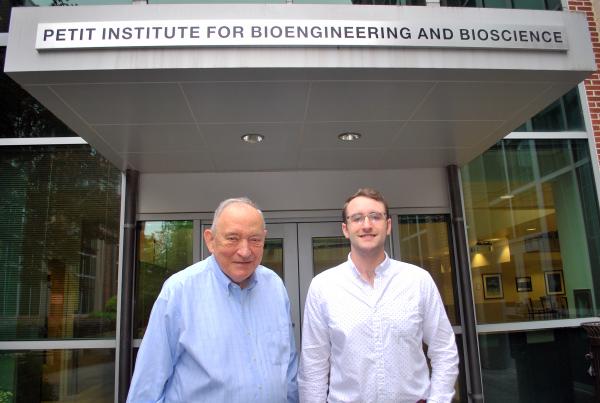Jackson Hair, a graduate student in the Wallace H. Coulter Department of Biomedical Engineering at Georgia Tech and Emory (BME), is the 2017 Nerem International Travel Award winner.
Hair, who also earned his undergraduate degree in BME at the Georgia Institute of Technology, is a second-year Ph.D. candidate advised by John Oshinski, associate professor of BME and a researcher in the Petit Institute for Bioengineering and Bioscience, known for his thought leadership in advancing MRI (magnetic resonance imaging) technologies.
The Oshinski team’s research is specifically focused on developing techniques to improve the diagnosis and treatment of cardiovascular disease, and that’s why Hair will be using his award to travel to Switzerland, where he’ll study with the experts at the University of Lausanne’s Center for BioMedical Imaging (CIBM).
“Most of my research looks at coronary artery disease, which is pretty deadly but treatable,” says Hair. “But the standard method to determine which patients need treatment, and which don’t, is invasive and expensive. So we’re trying to figure out a better way.”
Cardiac catheterization is the traditional diagnostic test to look at the heart and blood flow, but for the past 15 years or so, researchers have been working to perfect MRI for cardiac diagnosis. Basically, it’s a noninvasive procedure that lasts only 30 minutes – no catheter threading its way to the heart by way of an arterial puncture, and none of the small risks associated with catheterization.
Hair’s thesis project title is “Non-invasive estimation of fractional flow reserve using magnetic resonance imaging and computational fluid dynamics.”
“As part of the research, I want to determine which MRI protocol is best,” Hair says. “Coronary arteries have a complex shape, so MRI imaging can be difficult. But there’s a novel technique called XD-GRASP that has been getting really good images. I’m going to study with the group that developed the technique at the University of Lausanne.”
So he plans to take what he learns in Switzerland at the CIBM, which is directed by one of the world’s leading imaging experts, Matthias Stuber, and apply it to his research at Georgia Tech and Emory, repeating a pattern of knowledge-sharing that has become a traditional component of the travel award program.
Previous awards have sent trainees from Georgia Tech across the planet, to some of the world’s top research universities and institutions, including the Karolinska Institute (Sweden), the RIKEN Brain Science Institute (Japan), the National University of Singapore, the University of Twente (The Netherlands), Queensland University of Technology (Australia), and the Max Planck Institute (Germany), among others.
The program, which began in 2005, was created by friends and colleagues of Bob Nerem, the Parker H. Petit Distinguished Chair for Engineering in Medicine and Institute Professor Emeritus, as well as founding director of the Petit Institute. They established an annual award of up to $3,000 to support post-docs and graduate students traveling outside the U.S. for research.
But as Nerem has often pointed out, the experience abroad should also include some cultural education. Hair will spend two to three weeks in Switzerland, accompanied by his wife, “so other than working, I’m hoping we can visit the surrounding area, specifically the Alps,” he says. “We’ll definitely try to take advantage of the weekends as much as possible!”
CONTACT:
Jerry Grillo
Communications Officer II
Parker H. Petit Institute for
Bioengineering and Bioscience
Media Contact
Jerry Grillo
Communications Officer II
Parker H. Petit Institute for
Bioengineering and Bioscience
Keywords
Latest BME News
Jo honored for his impact on science and mentorship
The department rises to the top in biomedical engineering programs for undergraduate education.
Commercialization program in Coulter BME announces project teams who will receive support to get their research to market.
Courses in the Wallace H. Coulter Department of Biomedical Engineering are being reformatted to incorporate AI and machine learning so students are prepared for a data-driven biotech sector.
Influenced by her mother's journey in engineering, Sriya Surapaneni hopes to inspire other young women in the field.
Coulter BME Professor Earns Tenure, Eyes Future of Innovation in Health and Medicine
The grant will fund the development of cutting-edge technology that could detect colorectal cancer through a simple breath test
The surgical support device landed Coulter BME its 4th consecutive win for the College of Engineering competition.








